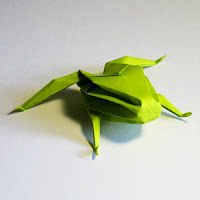WHAT'S ORIGAMI?
- Origami (ori meaning "folding", and kami meaning "paper") is the traditional Japanese art of paper folding,
- Objective of this art is to transform a flat sheet of paper into a finished sculpture by folding and sculpting techniques.
- Cuts and glue are not considered as origami.
- Most well-known origami model, is the Japanese paper crane.
TYPES OF ORIGAMI
Action Origami: Origami that not only covers still-life, but also moving objects which also include origami that flies.
Modular Origami: Consists of putting a number of similar pieces together to form a complete model.
Wet-Folding: An origami technique for producing models with gentle curves. The paper is dampened so it can be moulded easily, the final model keeps its shape when it dries. Produce a very natural looking animal models.
Pureland Origami: Is an origami with a restriction of only one fold may be done at a time. More complex folds like reverse folds are not allowed, and all folds have straightforward locations.
Origami Tesselations: A collection of figures filling a plane with no gaps or overlaps. In origami tessellations, pleats are used to connect molecules such as twist folds together in a repeating fashion.
Kirigami: Kirigami is a term in Japanese for paper cutting.
Moneygami: Origami using currency notes instead of paper.






.jpg)
.jpg)
No comments:
Post a Comment